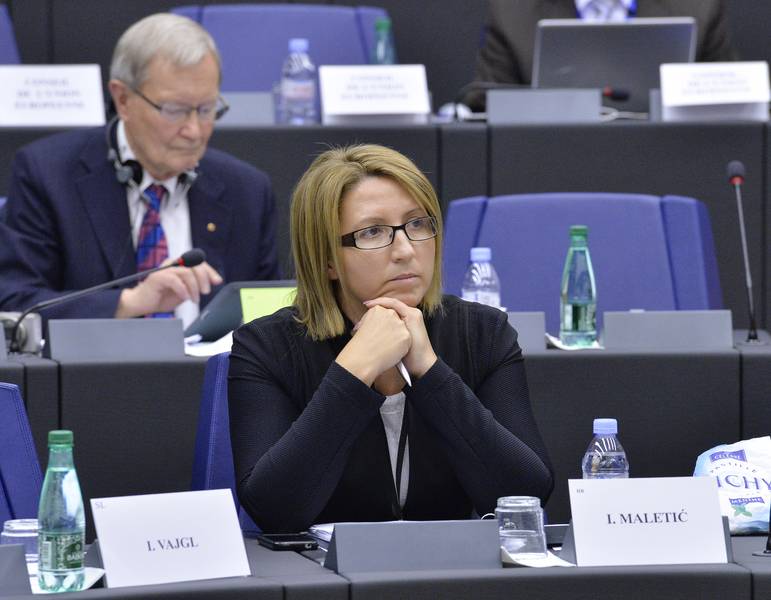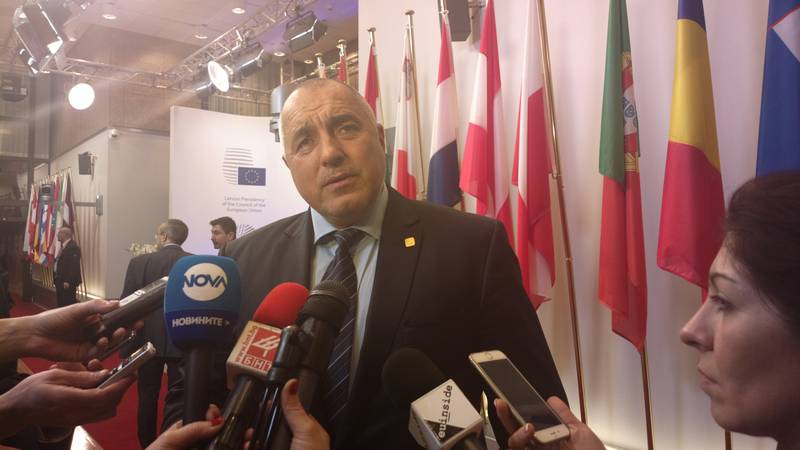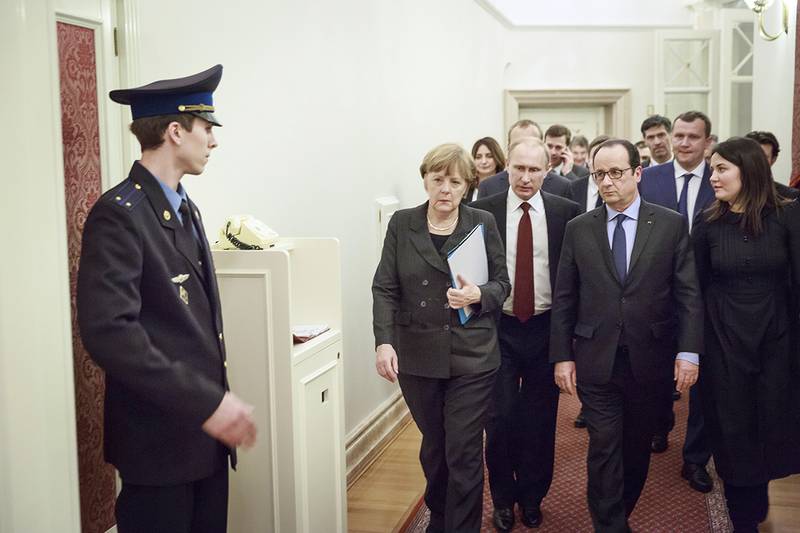The EU Economic Governance - a Game for Grown-ups
Adelina Marini, February 12, 2015
 In December, when the new European Council President Donald Tusk decided to call an informal summit in February to discuss the future of the euro area, the elections in Greece were not on the horizon, the attack on Charlie Hebdo had not happened yet and the situation in Ukraine had not deteriorated further. And although it will no longer dominate, the issue of the future of the Economic and Monetary Union will stay on the agenda of the one-day summit. The "menu" of the European Council, however, will not at all be a dietary one as Mr Tusk hoped in December. It includes three very cholesterol-rich topics - what actions should the EU undertake in terms of Russia; the fight against terror; enhancing the coordination in the eurozone; Greece. The latter two issues - the euro area's economic governance (and EU's for that matter) and Greece - could be viewed to a large extent in a package.
In December, when the new European Council President Donald Tusk decided to call an informal summit in February to discuss the future of the euro area, the elections in Greece were not on the horizon, the attack on Charlie Hebdo had not happened yet and the situation in Ukraine had not deteriorated further. And although it will no longer dominate, the issue of the future of the Economic and Monetary Union will stay on the agenda of the one-day summit. The "menu" of the European Council, however, will not at all be a dietary one as Mr Tusk hoped in December. It includes three very cholesterol-rich topics - what actions should the EU undertake in terms of Russia; the fight against terror; enhancing the coordination in the eurozone; Greece. The latter two issues - the euro area's economic governance (and EU's for that matter) and Greece - could be viewed to a large extent in a package.
According to plan, the summit was supposed to last only several hours - from 13.00 CET until 19.00, quite in the spirit of the desire for speed and resolution of the member states and Donald Tusk. According to a senior EU source, however, due to the hard-to-digest menu, it is very likely that the summit could take longer but not because of the economic governance per se but because of the problems with Greece which is practically rejecting everything agreed at EU level so far. This does not at all create a feeding ground for a debate on the deficiencies of the economic governance, reformed significantly in 2011 and 2013 and even less to share views about the evolution of the euro area.
What is wrong with the economic governance?
As euinside wrote recently, there is a feeling in the EU that something is not quite right with the Union's economic governance, significantly strengthened because of the crisis which started, as a matter of fact, in Greece five years ago. But for now, although the discussions have been quite intensive, there is no appetite to discuss changes. The reason is not only Greece but France and all the others that do not implement what had been agreed at EU level. Two weeks ago, the ministers of finance of Germany and Italy appeared together in the economic committee of the European Parliament to present their ideas for changes. According to Italy's Minister of Finance Pier Carlo Padoan, it is still early for specific proposals but it would be good to do an evaluation of the current framework to see if the current legislation has contributed to achieve greater integration, balanced growth, more jobs, closer economic convergence. At this stage, the answers to these questions are not satisfactory, he said at the hearing.
For the economic governance to be efficient it needs to be based on a coherent political mix of fiscal, structural and monetary policies. Moreover, one should think supranationally. The euro crisis has shown that a monetary union could develop imbalances not foreseen by the architects. More coordination is needed to avoid that. We should also be very careful with the spillover effects and to make a clear assessment of the domino effect, the Italian finance minister added. The most important thing, however, is to achieve harmony between the European and national level. A thesis Pier Carlo Padoan states very often. According to him, it is crucial every member state to enhance its national responsibility.
If we want to improve the situation radically, we need to change the legal framework which, however, needs treaty change in order to go for a political union. The euro area is facing some very tough institutional issues the answers to which are sought in the current legal framework, said for his part Germany's Finance Minister Wolfgang Scheuble. His view is, however, that it is meaningless to make any changes if the rules will not be adhered to. Naturally, every member state has sovereign rights, but there are rules and norms all of us have agreed together but many partners simply forget that, he recalled and admitted that Germany was among the first to violate the rules. This is an important lesson which we have learned, he added.
Both ministers refrained from giving specific ideas which disappointed the MEPs to some extent who, too, are not quite certain in what direction possible changes should go. Currently, they are preparing a report on a possible reform of the EU economic governance which introduced in the wake of the crisis the procedure of macroeconomic imbalances and the enhanced coordination of the budget plans (for the euro area). There is also a debate on increasing the social impact of the structural reforms. The rapporteur of the economic committee of the European Parliament Pervenche Berиs (France, S&D) on the issue raises several very specific questions which need to be answered to in the coming months. One is for clearer definitions of key provisions of the Stability and Growth Pact like "exceptional circumstances", "severe economic downturn", "unexpected adverse economic event". In Ms Berиs's working document another important question is raised - to what extent the proposed by the Commission flexibility could lead to improving the growth perspectives of the eurozone combined with structural reforms and expanded monetary policy.
Another important issue she raises in the working document is whether the rules of the economic governance in terms of debt reduction contain sufficient flexibility in the context of very low inflation. In the past months, a major focus in the debates on the issue is put on national measures. This is expected to be the focus also during the EU summit on 12 February. It is possible to discuss short-term and long-term measures like a reform of the economic governance, for instance, but it is more likely the leaders to focus on what can be done at national level. No one has illusions that the economic issues are not part of the national sovereignty. Everything that can be done depends on the political will of the member states. No one in Brussels is in a position to change that, said a well placed EU source. And the situation in Greece illustrates that very well.
The negotiations with the new Greek government which wants revolutionary exceptions from the common rules will take place in the Eurogroup, as always. There is still no concrete proposal presented by Greece which could serve as a basis to discuss anything (by the time this article was translated the negotiations in the Eurogroup on 11 February failed and will be renewed on Monday, 16 February).
The smaller member states are passive on the issue of economic governance
Although they sit at the negotiations table in the various EU formats as equals, the newer and smaller member states (generally, those outside the euro area) are more passive and non-interested in the debate on something so fundamental as the economic governance of the EU. In Croatia and Bulgaria, the two issues are completely absent from the public discourse, although Croatia should be very interested because it is directly affected by the new rules. It has been in a recession a sixth year in a row, its public debt has grown enormously in the past years, the unemployment is very high, especially among the young people, the Commission has launched an excessive debt procedure and established macroeconomic imbalances. The country-specific recommendations of the Commission on Croatia are unprecedentedly specific.
In other words, one would suggest that Croatia should be among the first to give their contribution to the debate on the reform of the economic governance. For now, the country is passive. Srdjan Gjurkovic, chairman of the parliamentary committee on finance and budget told euinside that any changes would be welcome, but he could not be very specific. There are still no specific decisions, the debate is too broad and I find it hard to tell what would be good to change, he said. What is good for Croatia is to ensure the same flexibility for the EU funds as that for the investment plan. Croatia could benefit a lot from the flexibility of the fiscal rules because this would allow for more investments and consumption in addition to the spending cuts, he added but, again, he was not very specific.
 According to Croatian MEP Ivana Maletic (EPP), who is a member of the economic committee of the European Parliament, the new guidelines for application of fiscal rules give Croatia a possibility to extend the deadline for correction and therefore allow for slower fiscal consolidation to open sufficient room for new investment and financing of reforms. However, this is possible only if quality structural reforms are being implemented which is not the case with the current government, she said. Ms Maletic believes, though, that Croatia cannot take advantage of the temporary deviation from the mid-term budgetary objective because it is in an excessive deficit procedure. She, too, believes the Commission should exclude the national co-financing of projects financed by EU funds from the calculation of the budget deficit. At this stage, the Commission foresees an exception only for those who participate in the investment fund but, according to Ivana Maletic, such a flexibility for the EU funds as well will significantly help Croatia and will open greater space for the necessary investments.
According to Croatian MEP Ivana Maletic (EPP), who is a member of the economic committee of the European Parliament, the new guidelines for application of fiscal rules give Croatia a possibility to extend the deadline for correction and therefore allow for slower fiscal consolidation to open sufficient room for new investment and financing of reforms. However, this is possible only if quality structural reforms are being implemented which is not the case with the current government, she said. Ms Maletic believes, though, that Croatia cannot take advantage of the temporary deviation from the mid-term budgetary objective because it is in an excessive deficit procedure. She, too, believes the Commission should exclude the national co-financing of projects financed by EU funds from the calculation of the budget deficit. At this stage, the Commission foresees an exception only for those who participate in the investment fund but, according to Ivana Maletic, such a flexibility for the EU funds as well will significantly help Croatia and will open greater space for the necessary investments.
Bulgaria was until recently one of the most fiscally disciplined EU member state, but since last year its budget deficit has started to climb again. The expectations are this trend to continue. Bulgaria, too, as Croatia, prefers to keep a low profile on the issue and not to be among the pro-active members in terms of flexibility and the reform of the economic governance. Regarding the new flexibility guidelines, they could have a very good impact on Bulgaria, which has a much stricter law on public finances, especially in a situation of a growing deficit. At this stage, it is very early to make an in-depth assessment of the work of the updated legislation. The Bulgarian ministry of finance believes that it is necessary to improve the incentives for the member states to implement the country-specific recommendations and to review and evaluate the possible options for simplification of the rules and procedures without changing the current legislation.
As a matter of fact, the implementation of the country-specific recommendations has been outlined by the Commission itself as one of the greatest deficiencies of the EU's economic governances. The Croatian economic analyst from the Institute of Economics in Zagreb, Zoran Aralica, explains this, specifically for Croatia but for the south-eastern members of the EU as well, that there is too little understanding in these countries of the complex mechanisms of the economic governance. The public policies are predominantly reactive, there is no in-depth analysis, the adopted legislation is applied automatically. Very few assessments and analyses are done ex ante to see the possible impact the planned measures or decisions could have at national but also at local level. What is needed is interinstitutional cooperation with very high level of professionalism which, regretfully, he said, is not the case.
The reasons are the frequent changes of the management in the public sector and the problem to keep the competent servants. The Commission could be very helpful if it could organise visibility events explaining the mechanisms and if it would provide technical assistance of how to apply the economic governance on the basis of the experience of other member states. Otherwise, this turns into a game of the big member states in which the smaller ones are neutral and forced to apply automatically or they just choose not to apply anything. And while the small ones are fighting with the lack of administrative capacity to implement what has been agreed at the EU summits, the big ones are expected to decide in what direction should the eurozone continue its development. Something which does not at all intrigue the countries outside, despite the fact that most of them are obliged by their accession treaties to join one day. The discussion at the informal summit of the EU will take place in the context of the investment plan, the flexibility guidelines, the ECB decision to expand further monetary policy and of Greece.
The only element that is missing is structural reforms and more specifically how can the member states be forced or stimulated to implement them them not only in a national context but with an EU perspective, said the EU source. But how can this problem be resolved without amendments to the economic governance or treaty changes for which there is no appetite in the European Council? This is the big question the leaders might not answer at their summit on 12 February but which the four presidents will seek and answer by June. The option with an interinstitutional agreement has proved to be inefficient as the experience with the fiscal compact shows. A way must be found what has been agreed at EU level to be applied at national level. After the elections in Greece, however, this seems much more unrealistic. May be that is why, the leaders will be happy that the issues will be replaced by other, not so fat, issues.
 Klaus Regling | © Council of the EU
Klaus Regling | © Council of the EU Mario Centeno | © Council of the EU
Mario Centeno | © Council of the EU Mario Centeno | © Council of the EU
Mario Centeno | © Council of the EU Boyko Borissov | © euinside
Boyko Borissov | © euinside Angela Merkel, Vladimir Putin, Francois Hollande | © Bundesregierung
Angela Merkel, Vladimir Putin, Francois Hollande | © Bundesregierung